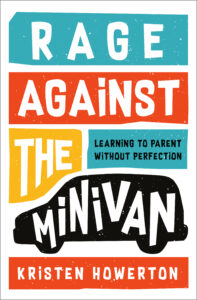But They Are Such Cute Little Narcissists……by Kristen Howerton, author, Rage Against The Minivan (Book Excerpt)

They’re awful people.
They’re tiny, tiny little Hitlers, all of them……Donald Glover
If I had to sum up motherhood in one philosophical statement it would be this: They come out of the womb as narcissists, and you have eighteen years to try to change that. If, by the time they move out of your house, they are able to consider others with some level of empathy, attend to the feelings of others, and see the world outside themselves and the people who inhabit it as valid and important, you’ve done your job.
Most people dislike the idea of their own kid being a narcissist, but hear me out. Babies have absolutely no concept of thinking about how others are feeling. In fact, developmentally, at first they don’t even understand that other people are separate from them. Other people function only to meet their needs, be it food, comfort, or changing.
I found parenting newborns to be particularly difficult be- cause they don’t give you much positive feedback. My first child joined our family at six months old. On my first day as a mom, he was reacting to me (and sleeping through the night can I get an amen?). He would smile and laugh, he would giggle and coo. Sure, he was also mostly concerned with his own needs. But at least he was giving me something.
Then I got pregnant and had a baby the way that involves having your lady parts rearranged and your midsection blown up beyond recognition and your hormones staging a coup against your brain. All of this coming after months of discomfort, heartburn, weight gain, and waddling. I found pregnancy to be incredibly uncomfortable, and at some point I began jokingly referring to my baby as my “parasitic being.” Listen, mocking is my love language. And I started early with my children.
On one particularly difficult day, I was sitting on the sofa feeding my newborn, feeling completely trapped by this ten- pound human who never smiled and barely interacted with me except to cry, poop, and eat. I said to my husband, “It’s like she’s still a little parasite!” And you might be reading this and thinking, How could you say that about your children? But you know what? Every newborn ever is a selfish needy blob. Even you were. Babies’ only interest in life is getting their needs met by others. And our job as parents is to make sure they grow out of it.
It’s developmentally normal that babies are self-centered and demanding. But that doesn’t make it any easier when you are a tired new mom and just want to sit down already and you hear that shrill dolphin newborn cry bidding you to get up and change a diaper.
Most of my worst moments happened when trying to get my babies to sleep. I spent many a night with my hand on the back of a newborn in their crib, willing them to stop crying, only for them to start crying the minute I removed my hand and started to creep toward the door. Why do they need me here? Why is this baby so codependent? Why won’t she just let me sleep? This baby has no respect for my boundaries. These are the irrational things I found myself thinking in those desperate, sleep-deprived moments.
Babies are completely oblivious to your feelings, and then they turn into toddlers. Toddlers are not just narcissists, they are also psychopaths. They maintain all the self-centeredness of a newborn, buttressed by mind games and limit-testing! Their lives revolve around meeting their own needs and trying the bounds of your own emotional regulation.
When my kids were toddlers, we had a cutting-edge TV that had a DVD and a VCR built in. (Yes, I’m dating myself. I’m also old enough that I used the Internet for the first time after graduating from college. Shout-out to microfiche!) Anyway, the slots for the VCR and DVD were right at eye-level for a curious toddler, and it quickly became their favorite toy. They loved to sit and push on the VCR flap. But the real payoff feature was the DVD slot. You push that eject button, and a thing slides out, often a DVD that you can now play with.
The DVD function got broken by toddler shenanigans more times than I can count, and it became a battle of wills with every toddler that lived in my house (which, if you are keeping count means for about six consecutive years). Every day was an opportunity for them to defy me, get past me, and push that precious button.
At some point, every single one of my kids had a showdown with me that involved me looking straight at them, reminding them the answer is no, and them proceeding to push the DVD button while making direct eye contact with me as if to say, I see you, bitch. What are you going to do about it? And really, what was I going to do about it? I mean, the global move away from spanking has been humane and psychologically appropriate, but it has left us kind of impotent in these moments, hasn’t it?
The life mission of a toddler is to get a rise out of you and watch you lose control. Intentionally throwing their plate of food and then crying that they no longer have said food is a toddler’s idea of family bonding. Dropping a toy from the grocery cart and then screaming until you pick it up and hand it back, over and over and over again, is a thing toddlers would list on their résumé under “hobbies and special interests.” Imagine if an adult were engaging in this behavior: throwing something for no reason, requiring another person to pick it up, doing it over and over again, and screaming if the cycle stopped. We would label that person a sociopath. If you vetted the behavior of a toddler against a checklist of a “toxic person,” they would check every single box. When people ask me how to survive the toddler years, I literally shrug and say, “I don’t know, man. Just survive.” This book is 100 percent free of advice for how to man- age a toddler because I have none, except to just power through it and know that it is universally awful.
But then they emerge from the infant narcissism and the toddler psychopathology and become kids who are observant, sometimes kind, and often thoughtful. They begin to notice your feelings and sometimes even try to attend to them. They reflect back what you say. They are reciprocal in conversations. They try to comfort you. They initiate hugs and affirmations. They aren’t perfect, but you start to see the glimpses of an emotionally attentive person in them.
Age fiveish to about twelve these are the golden years of parenting. A small but beautiful window where you are not regularly wanting to cry or drink because of their behavior. A time when kids are cuddly and cute and delightful, at least some of the time. And then they become teenagers.
I know there are many theories of child development floating around, from Piaget to Freud. But I’d like to postulate my own developmental framework.
STAGES OF PARENTING
Age 0–2: Keep them from putting something in their mouths they can choke on.
Age 3–5: Keep them from falling from heights that could maim or kill them.
Age 6–12: Brief window of reciprocal parent-child enjoyment.
Age 13–18: Keep them from doing drugs, looking at porn, or making you a grandparent.
This Mother’s Day, I woke up to four kids giggling excitedly out- side my door. They knocked and entered, with a tray full of breakfast for me. They’d made my eggs over medium, just the way I like them. They’d toasted me some gluten-free bread. They’d brewed my favorite tea. There were little finger trays of perfectly arranged fruit, and there was a vase with a rose from my front yard. They had each made me a card and coupon book for future acts of service. And they had done all of this on their own, without help and with absolutely no money. Every aspect had been thoughtfully and carefully planned and executed by my former needy parasitic blobs, and I had one of those hard- earned moments of parenthood when I thought, Maybe I’m not totally bungling this.
 ABOUT THE AUTHOR:
ABOUT THE AUTHOR:
Kristen Howerton is a licensed marriage and family therapist and became the mother of four children within four years via birth and adoption. She is the founder of the blog Rage Against the Minivan and has created several popular humor destinations online, including the popular Tumblr “Pinterest, You Are Drunk” and the #assholeparent meme and Instagram account. She is the co-host of Selfie, a podcast dedicated to exploring the mind, body, and spirit aspects of self-care. https://www.kristenhowerton.com/
Excerpted from Rage Against the Minivan by Kristen Howerton. Copyright © 2020 by Kristen Howerton. Excerpted by permission of Convergent Books, an imprint and division of Penguin Random House LLC, New York. All rights reserved. No part of this excerpt may be reproduced or reprinted without permission in writing from the publisher.
Tags: having kids, kristen howerton, later in life mother, parenting, rage against the minivan, raising a family















